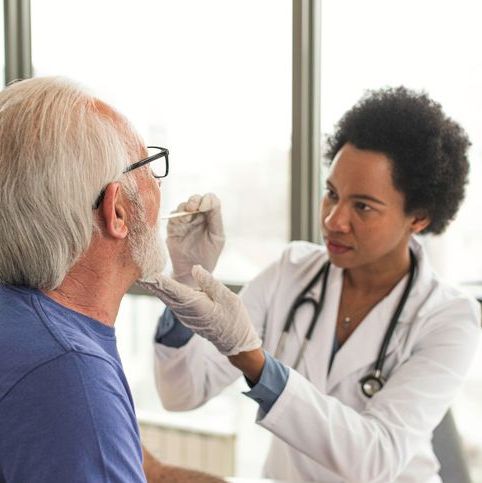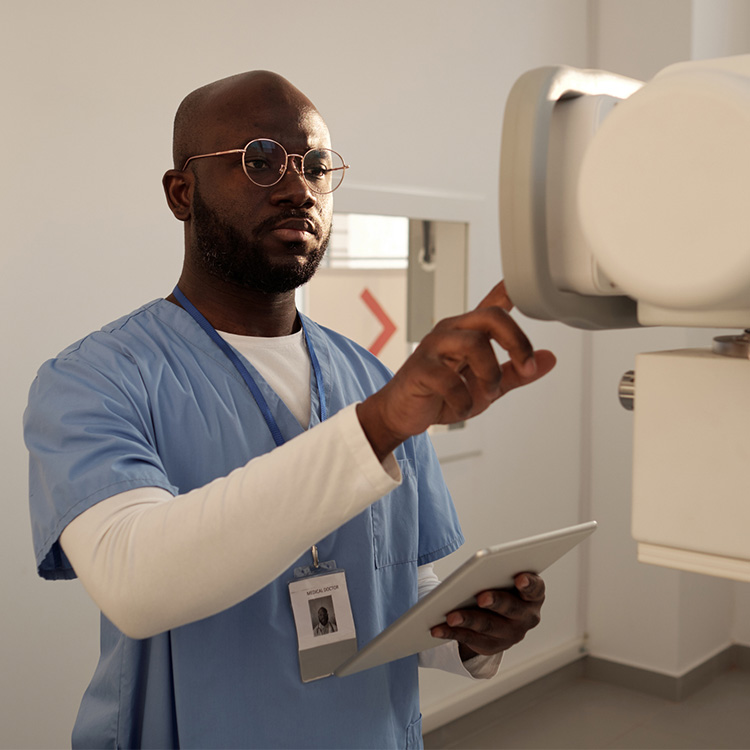AllCare is pleased to announce the opening of its newest location in Braselton, expanding access to high-quality, patient-centered healthcare for...
Pneumonia Treatment in Georgia
Pneumonia Treatment and Care
While some illnesses occur only during specific seasons, pneumonia can affect anyone at any time of the year. It can range from mild to life-threatening, so it’s important to recognize the symptoms early, as pneumonia may be mistaken for other illnesses like the flu or common cold. At AllCare Primary & Immediate Care, our team of dedicated healthcare professionals can provide a precise diagnosis and personalized treatment plans for pneumonia. We offer compassionate urgent and primary care services all in one convenient location, delivered by experts who will prioritize your comfort throughout every step of your recovery.

What is Pneumonia?
Pneumonia is a common lung infection that can be caused by bacteria, viruses, or fungi. It occurs when these germs invade the lungs, leading to inflammation and fluid buildup in the air sacs, which can make breathing difficult. Mild cases may go away on their own, but pneumonia can be life-threatening, especially for those with underlying health conditions, like heart disease, diabetes, or respiratory issues, or for older adults and young children.
Pneumonia Testing and Treatment in Georgia

How Do You Get Pneumonia?
Pneumonia often follows an upper respiratory infection like the flu or the common cold, but it can also be contracted through exposure to germs in the air when someone with pneumonia sneezes or coughs or by inhaling toxic fumes or even food particles. It’s important to seek prompt medical care if you experience pneumonia symptoms, as early treatment can help prevent the infection from worsening and causing lasting lung damage.
Common Pneumonia Symptoms
- Cough
- Fever
- Chills
- Shortness of breath
- Rapid or shallow breathing
- Chest pain that gets worse when you breathe deeply or cough
- Fatigue
- Loss of appetite
- Nausea
- Vomiting
- Diarrhea
- Bluish color to the lips and fingernails
Types of Pneumonia
There are four main types of pneumonia.
- Bacterial Pneumonia: This type is caused by bacteria, with Streptococcus pneumoniae being the most common cause. It can affect a small part of your lung or spread across both lungs. Bacterial pneumonia often requires antibiotics to treat and can become more severe if not addressed quickly.
- Viral Pneumonia: Viral pneumonia is responsible for about one-third of pneumonia cases and is caused by several viruses, including the flu. It’s generally less severe than bacterial pneumonia and tends to improve on its own. However, having viral pneumonia can sometimes lead to bacterial pneumonia as a secondary infection.
- Mycoplasma Pneumonia: Often called “walking pneumonia, this type of pneumonia is considered atypical, meaning its symptoms can be mild or less noticeable compared to other types. It’s most common in younger people, like older children and young adults, and tends to cause a mild illness that doesn’t usually require bed rest.
- Fungal Pneumonia: Fungal pneumonia occurs when you inhale fungi from the environment, such as from soil or bird droppings. One specific type, Pneumocystis jirovecii pneumonia (PCP), is more common in individuals with weakened immune systems, such as those with HIV/AIDS.


Online Doctor Visits and Telehealth Services
Experience the convenience of telehealth appointments at AllCare Primary & Immediate Care. Our telemedicine services are designed to provide you with seamless access to healthcare without the need to leave your home. Whether you need an online doctor’s appointment for immediate or primary care, AllCare’s got you covered. With our online telehealth services currently available to individuals located in Georgia, you can connect with our experienced urgent and primary care physicians via secure video calls.
At AllCare Primary & Immediate Care, we are expanding our virtual healthcare access to all services previously offered in person. This includes:
Who Can Benefit from Pneumonia Treatment
Adults and children who are experiencing symptoms of pneumonia can benefit from our pneumonia treatment services. It’s important to receive a proper diagnosis if you are experiencing pneumonia, as it can be a life-threatening condition for certain individuals. Anyone experiencing any of the following should seek care for their pneumonia:
- You are having trouble breathing
- You have a high fever
- You are experiencing a cough with mucus that is severe or is getting worse
- You are coughing up blood
- You have rapid, uncontrolled breathing
- You are an adult older than age 65
- You have a child aged two or younger
- You have an underlying health condition or weakened immune system
- You are receiving chemotherapy or taking medication that suppresses the immune system
In addition, if you are experiencing difficulty breathing, have a bluish color in your lips or fingertips, or are experiencing chest pain, you should call 911 or seek immediate care at your local emergency center.

Frequently Asked Questions
What causes pneumonia?
Pneumonia is caused by infections from bacteria (like Streptococcus pneumoniae), viruses (like influenza or RSV), fungi, or parasites. It can also occur from inhaling food, liquids, or harmful substances, known as aspiration pneumonia. Certain factors, such as smoking, chronic illnesses, weakened immune systems, and being very young or elderly, increase the risk of developing pneumonia.
Is pneumonia deadly?
Pneumonia can be life-threatening, especially for vulnerable groups like the elderly, infants, or those with weakened immune systems. Severe cases can lead to complications like respiratory failure, sepsis, or lung abscesses. However, with prompt medical treatment, most people recover fully. Early detection and proper care are key to reducing the risks.
Can pneumonia be prevented?
While pneumonia can’t fully be prevented, you can take steps to reduce your risk, including:
- Getting vaccinated
- Practicing good hygiene
- Maintaining a healthy lifestyle
- Controlling chronic conditions like diabetes
- Limiting alcohol, which can weaken your immune system
How Is pneumonia diagnosed?
Pneumonia is diagnosed through a combination of medical history, physical exams, and diagnostic tests. During the exam, your doctor will listen to your lungs with a stethoscope for abnormal sounds like crackling. Common tests include:
- Chest X-rays to check for inflammation or fluid in the lungs.
- Blood tests to detect infection.
- Sputum analysis to identify the type of germ causing the infection.
- Pulse oximetry to measure oxygen levels in the blood.
In some cases, more advanced imaging or bronchoscopy may be required for diagnosis.
How long does it take to recover from pneumonia?
Recovery from pneumonia varies based on factors like age, overall health, and the severity of the infection. Mild cases can improve in a week or two, but fatigue and lingering symptoms may last longer. For more severe cases, recovery can take several weeks to months. Always follow your doctor’s treatment plan and rest adequately to support full recovery.
schedule your pneumonia testing appointment
The Latest Healthcare News
Check out our blog to learn more from our team about the latest medical advancements, health tips, and primary care news.
Lauren Schwartz, F.N.P.-C. of AllCare Appeared on “The Weekly Check-Up” Radio Show
Lauren Schwartz, F.N.P.-C. of AllCare Primary & Immediate Care appeared as a featured guest on “The Weekly Check-Up” on December 21, 2025. The...
AllCare’s Dr. Racheal Daniels Discusses Holiday Health and Primary Care on WSB-TV’s “Daily 2”
Dr. Racheal Daniels of AllCare Primary & Immediate Care recently appeared on WSB-TV’s Daily 2 to discuss the importance of prioritizing primary...
Related Services
Our related healthcare services extend beyond immediate care to include preventive care such as routine physical exams, chronic disease management for conditions like diabetes, and specialty care referrals for more complex health issues.












